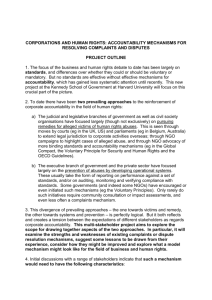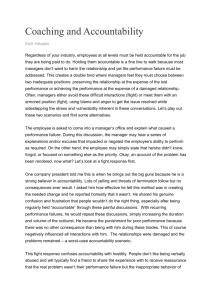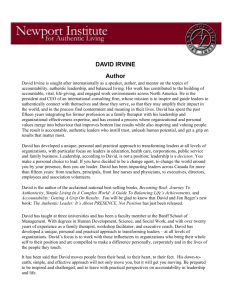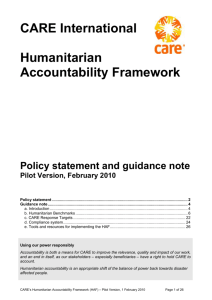François Grünewald
advertisement
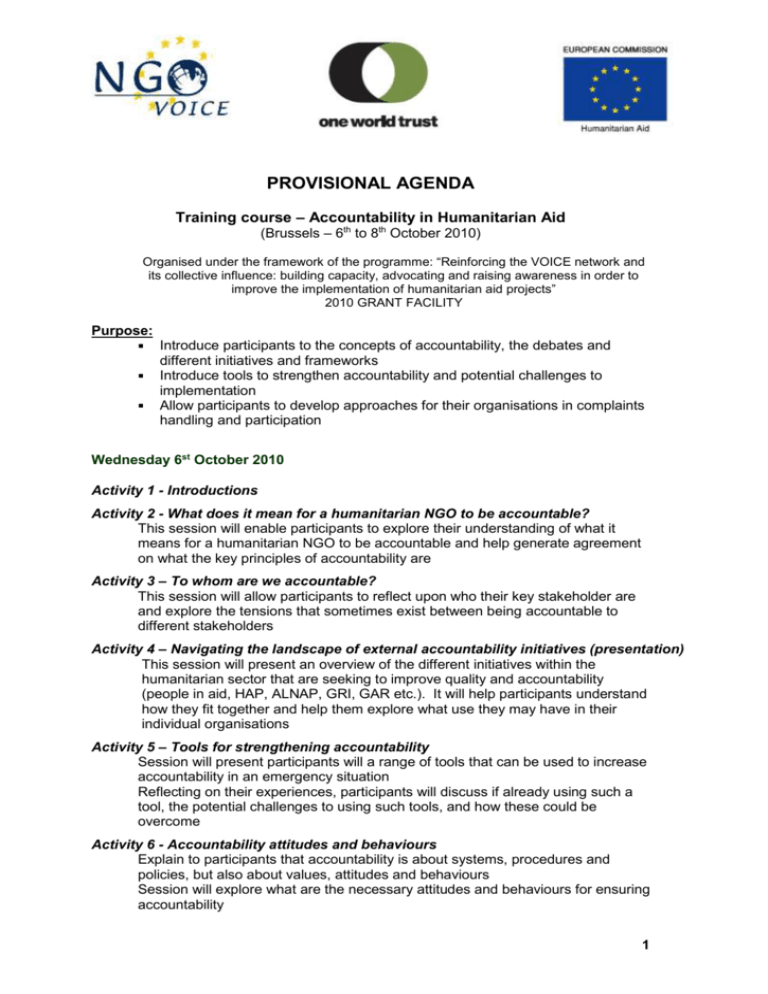
PROVISIONAL AGENDA Training course – Accountability in Humanitarian Aid (Brussels – 6th to 8th October 2010) Organised under the framework of the programme: “Reinforcing the VOICE network and its collective influence: building capacity, advocating and raising awareness in order to improve the implementation of humanitarian aid projects” 2010 GRANT FACILITY Purpose: Introduce participants to the concepts of accountability, the debates and different initiatives and frameworks Introduce tools to strengthen accountability and potential challenges to implementation Allow participants to develop approaches for their organisations in complaints handling and participation Wednesday 6st October 2010 Activity 1 - Introductions Activity 2 - What does it mean for a humanitarian NGO to be accountable? This session will enable participants to explore their understanding of what it means for a humanitarian NGO to be accountable and help generate agreement on what the key principles of accountability are Activity 3 – To whom are we accountable? This session will allow participants to reflect upon who their key stakeholder are and explore the tensions that sometimes exist between being accountable to different stakeholders Activity 4 – Navigating the landscape of external accountability initiatives (presentation) This session will present an overview of the different initiatives within the humanitarian sector that are seeking to improve quality and accountability (people in aid, HAP, ALNAP, GRI, GAR etc.). It will help participants understand how they fit together and help them explore what use they may have in their individual organisations Activity 5 – Tools for strengthening accountability Session will present participants will a range of tools that can be used to increase accountability in an emergency situation Reflecting on their experiences, participants will discuss if already using such a tool, the potential challenges to using such tools, and how these could be overcome Activity 6 - Accountability attitudes and behaviours Explain to participants that accountability is about systems, procedures and policies, but also about values, attitudes and behaviours Session will explore what are the necessary attitudes and behaviours for ensuring accountability 1 Thursday 7th October 2010 Activity 1 – Recap of day 1 Activity 2 – What is best practice in participation (presentation) Explore the key good practice principles when undertaking a participatory process Identify the common pitfalls Activity 3 – Engaging stakeholders in all stages of the project cycle Session will take the key steps in the project cycle (design, planning, implementation, monitoring and evaluation) and explore challenges and solutions to involving stakeholders Activity 4 – How to monitor the quality of participation This session will explore the tools that can be used to monitor how effectively stakeholders are participating in projects. Activity 5 – What are you going to do differently Based on what they have learnt over the past three days, participants will identify steps they can take to increase their accountability in the immediate term and in the long term Activity 6 – Reflections on the day Friday 8th October 2010 Activity 1 – Recap of day 1 and day 2 Activity 2 - Who might complaint to your organisation and why? Identify types of complainants and complaints; reasons for complaining; but also some of the practice and experience amongst participants/their NGOs in handling complaints Activity 3 - Introduction to complaints handling (presentation) Explore the link between C&R and accountability; introduce concepts and definitions; explore costs and benefits Activity 4 - What prevents us from complaining? Identify reasons for not complaining Activity 5 - Different approach to complaints handling Present a range of approaches to complaints handling and allow participants to reflect on which approaches would work in the contexts they are familiar with Activity 6 – Key issues to consider when designing a complaints mechanism (presentation) Outline the main steps in a complaint procedure and identify what issues need to be considered in order to ensure the process meets key good practice principles Activity 7 – Designing your own complaints mechanism Based on what they have learnt, participants will design, in groups, their own complaints mechanisms Activity 8 – Evaluations 2


